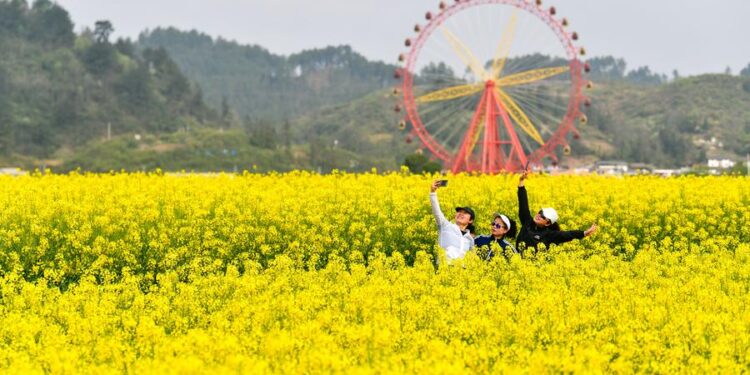Helicopter flights above rapeseed fields, Chinese shadow show by sipping tea, a tent meal installed in the middle of flowers … Upon arrival of spring, the Chinese turn to ever more original cultural and tourist experiences. Carried by the merger of sectors such as agriculture, catering, culture or even technologies, the “immersive” economy is rapidly gaining popularity.
While many Chinese regions are focusing on the development of the low -altitude economy, this type of immersive tourism experiences a real boom. In Chengdu, capital of the province of Sichuan (South West), Huaizhou airport now offers three seasonal circuits to fly over full bloom landscapes.
“Since the air, the rapeseed fields look like a golden patchwork, it’s soothing, almost hypnotic,” said Ms. Li, a client who came to test a tourist flight in helicopter.
According to Meituan data, a large Chinese commercial platform, searches related to panoramic flights has jumped 645% since March in annual shift, while the number of providers offering these services has doubled. Orders of these activities have increased by more than 280%.
In Beijing, the famous Maison de Thé Lao She, located in the shopping street of Qianmen, now offers a cultural experience: customers taste the first spring teas while contemplating performances of the Beijing Opera or Shadow Theater.
Catering professionals, too, bet on the arrival of sunny days. In the Mianxian district of Shaanxi province, the Haidilao group, a large chain of restaurants specializing in the Chinese fondue, installed 37 ephemeral tents in the heart of plantations, allowing visitors to savor a fondue surrounded by flowers.
In Beijing, another Chinese fondue brand even launches a gastronomic tourist bus, combining meal and visit of emblematic sites such as the Liangma river or the Beijing Olympic tower.
In several Chinese cities, old cities are reborn thanks to the enthusiasm of young people for traditional culture. A Luoyang, a city in the province of Henan (center), the alleys are filled with visitors dressed in traditional Chinese clothing Hanfu.
Between period makeup and photo sessions, the experience becomes as aesthetic as they are identity. According to Meituan, research linked to these traditional makeup services in Luoyang has increased by 213% since mid-March.
According to Hong Yong, research manager at the Chinese Academy of International Trade and Economic Cooperation, affiliated with the Chinese Ministry of Commerce, these immersive activities, by decompartmentalizing resources, redefine the limits of traditional consumption, offering customers an unprecedented sensory and emotional experience.
“With technological innovation and the evolution of expectations, the merger of the sectors will continue to generate innovative consumption scenarios, stimulating sustainable growth in the field of services,” he said.








